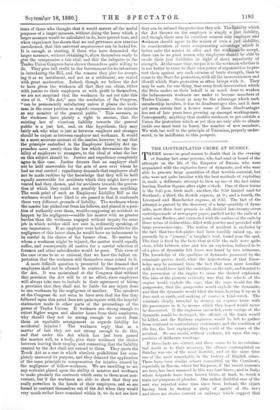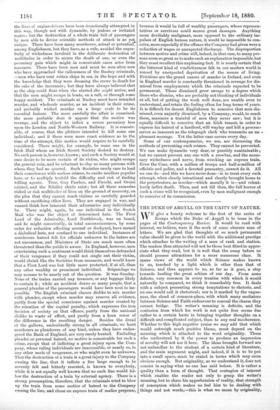THECONTEMPLATED CRIME AT BUSHEY.
THERE seems no good reason to doubt that in the evening of Sunday last some persons, who had read or heard of the attempts on the life of the Emperor of Russia, who were acquainted with the explosive force of dynamite, and who were able to procure large quantities of that terrible material, but who were not quite familiar with the best methods of exploding it, made a deliberate attempt to blow up one of the fast trains leaving Euston Square after eight o'clock. One of these trains is the 8.25 p.m. Irish mail ; another, the 8.50 limited mail for Scotland ; a third, the Scotch express, at 9; and a fourth, the Liverpool and Manchester express, at 9.15. The fact of the attempt is proved by the discovery of a large quantity of dyna- mite, more than four pounds in all, divided into twenty-seven cartridges made of newspaper paper, peeked under the rails at a point near Bushey, and connected with the surface of the rails by three tubes of iudiarubber, tilled with powder and provided with large percussion-caps. The notion of accident is excluded by the fact that two fish-plates had been forcibly raised up, ap- parently by a "jemmy," a burglar's tool, found near the spot. The time is fixed by the facts that at 6.50 the rails were quite clear, while between nine and ten an explosion, believed to be of a piece of dynamite left loose, was heard by two witnesses. The knowledge of the qualities of dynamite possessed by the criminals proves itself, while the imperfection of that know- ledge may be assumed from the fact that men more familiar with it would have laid the cartridges on the rails, and trusted to the percussion of the engine to cause the desired explosion. The idea of the plotters evidently was that the wheels of the engine would explode the caps, that the caps would fire the gunpowder, that the gunpowder would explode the dynamite, and that the dynamite would blast the train, heaving it up as it does rock or earth, and making, of course, a total wreck. The criminals clearly inteuded to destroy an express train with the passengers in it, by means which they hoped would never be discovered. If the explosion succeeded, every vestige of the dynamite would be destroyed, the officials of the train would be killed, and the Railway engineers would be left to gather from confused or contradictory statements, and the condition of the line, the best explanation they could of the causes of the accident. No one would, without evidence, hit upon the sup- position of deliberate wreckage.
If these facts are correct, and there seems to be no substan- tial doubt as to their accuracy, the offence contemplated on Sunday was one of the most horrible, and at the same time one of the most remarkable, in the history of English crime. There have been similar crimes committed on the Continent, especially in Russia, where the Emperor, if the recent rumours are true, has been menaced in this way four times ; and in Italy, where brigands have been known twice, at least, to wreck a train for purposes of plunder. One rather doubtful ease of the sort was reported some time since from Ireland, the object having been to destroy a party of agents of the law ; and there are stories current on railways which suggest that the lives of engine-drivers have been occasionally attempted in this way, though not with dynamite, by jealous or irritated mates ; but the destruction of a whole train full of passengers by men able to devise scientific methods of attack is as yet. unique. There have been many murderers, actual or potential, among Englishmen, but they have, as a rule, avoided the super- fluity of wickedness involved in the deliberate destruction of multitudes in order to secure the death of one, or even the pecuniary gain which might in conceivable cases arise from massacre. There have been men and, must be men alive now who have approached the callousness of the Bushey criminals, —men who have sent rotten ships to sea, in the hope and with the knowledge that they were dooming the crews to death for the sake of the insurance ; but they have always believed that as the ship could float when she started she might arrive, and that the men might escape in boats, on a raft, or through some happy accident. The criminals at Bushey must have intended murder, and wholesale murder, as an incident in their crime, and probably wished murder '011 a large scale to be its essential feature. The more carefully the affair is examined, the more probable does it appear that the motive was revenge, and the object to inflict a severe pecuniary loss upon the London and North-Western Railway. It is conceiv- able, of course, that the plotters intended to kill some one individual ; and if there were more exact evidence as to the time of the attempt, this motive would require to be carefully considered. There might, for example, be some one in the Irish Mail whom an Irish Secret Society desired to destroy. No such person is, however, known ; and such a Society would at once desire to be more certain of its victim, who might escape the general ruin, and be reluctant to slay so many persons with whom they had no quarrel. Such Societies rarely care to load their consciences with useless crimes, to excite needless popular hate, or to multiply tenfold the difficulty and risk of finding willing agents. True, Guy Fawkes, and Fieschi, and Orsini existed, and the Nihilist chiefs exist; but all these assassins risked or risk multitudes of lives on the ground of necessity, on the plea that they cannot reach victims so carefully guarded without sacrificing other lives. They are engaged in war, and cannot think how innocent their adversaries may individually be. There might, again, be one individual in the Scotch Mail who was the object of determined hate. The First Lord of the Admiralty, Lord Northbrook, was on board, and he might conceivably, in total unconsciousness, by some order for reduction affecting arsenal or dockyard, have earned a diabolical hate, not confined to one individual. Instances of murderous hatred felt for officials unknown to the haters are not uncommon, and Ministers of State are much more often threatened than the public is aware. In England, however, men entertaining such a sentiment would think themselves defrauded of their vengeance if they could not single out their victim, would shrink like the Societies from massacre, and would know that a First Lord was but little more protected, if at all, than any other wealthy or prominent individual. Brigandage we may assume to be nearly out of the question. It was Sunday. None of the trains carried any treasure, or any luggage likely to contain it ; while an accident draws so many people, that a general plunder of the passengers would have been next to im- possible. The English criminal classes dislike to mix murder with plunder, except when murder may remove all evidence, partly from the special conscience against murder created by the retention of the capital penalty, which expresses the iron decision of society on that offence, partly from the national dislike to waste of effort, and partly from a keen sense of the difference in the resulting danger. Besides the dread of the gallows, undoubtedly strong in all criminals, we hunt murderers as plunderers of any kind, unless they have endan- gered the Bank of England, are very rarely hunted. Excluding plunder or personal hatred, no motive is conceivable for such a crime, except that of inflicting a great injury upon the Com- pany, whose ruling individuals are inaccessible, or nearly so, to any other mode of vengeance, or who might even be unknown. That the destruction of a train is a great injury to the Company owning the line, that it inflicts a fine large enough to be severely felt and bitterly resented, is known to everybody, while it is not equally well known that no such fine would fol- low the destruction of a train by external agency. There is a strong presumption, therefore, that the criminals tried to blow up the train from some motive of hatred to the Company owning the line, and chose an express train of malice prepense,
because it would be full of wealthy passengers, whose represen- tatives or survivors could secure great damages. Anything more devilishly malignant, more opposed to the ordinary im- pulses of English human nature, it would be impossible to con- ceive,-more especially if the offence the Company had given were a reduction of wages or unexpected discharge. The disproportion between motive and crime will, indeed, in that case, to many per- sons seem so great as to make such an explanation impossible, but they must recollect this nnpleasing fact. It is nearly certain that the bitterest kind of vindictiveness felt in our modern world is roused by unexpected deprivation of the means of living. Evictions are the grand causes of murder in Ireland, and even in England murder is constantly threatened in revenge for dis- missal from employments which the criminals expected to be permanent. Those dismissed grow savage to a degree which those who dismiss, who are probably not thinking of individuals at all, but of getting the work well done, are unable even to understand, and retain the feeling often for long terms of years. It is difficult for decent Englishmen to conceive that men dis- missed, even unjustly dismissed, by a Company, would, to reach them, massacre a trainful of men they never saw ; but it is equally difficult to conceive that an Irish tenant, in order to express his hatred of a landlord, will waylay and kill a process- server as innocent as the telegraph clerk who transmits an un - pleasant message. Yet the latter case occurs every day.
Some of our contemporaries, we see, are discussing the methods of preventing such crimes. They cannot be prevented. We can make dynamite very dear, or possibly unattainable ; but we cannot prevent any one with a crowbar, and the neces- sary wickedness and nerve, from wrecking an express train. Even the Czar, with a million of troops and half-a-million of officials and police, and a devoted peasantry, cannot do it. All we can do—and this we have never done—is to treat every such attempt, when clearly intentional and clearly brought home to the perpetrators, as murder—which morally it is—and relent- lessly inflict death. Then, and not till then, the full horror of such a crime will be recognised, even by men malignant enough to conceive of its commission.



































 Previous page
Previous page